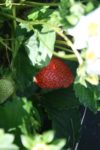Showing 1-2 of 2 results

Evaluating Nutrient, Soil Health, and Economic Benefits of Compost Additions to Summer Cover Crops for Strawberries in North Carolina
Over the past 8 years, a team of multidisciplinary faculty and students at NC State University have conducted various field-based studies at the Center for Environmental Farming Systems (CEFS) and on-farm research examining the impact of summer cover crops, compost additions and applications of beneficial arbuscular mycorrhizal fungi and vermicompost on soil health, nutrient availability, and yields in conventional and organic strawberry production systems.

Perennial Grass Cover Crops Can Optimize Wine Grape Growth
Vineyard cover crops or ‘living mulch’ consists of either sown or native vegetation, grown in vineyard row middles and/or inclusive of the area under the vine trellis (Fig. 1). Although cover crops can increase pest pressure (arthropods and voles) and vineyard management costs, benefits of cover crops include: erosion and weed control, reduction of herbicide use and mitigation of excessive vine vigor.